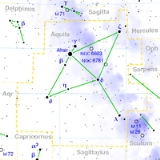
18 Aquilae
Encyclopedia
18 Aquilae or Y Aquilae is a star
in the constellation
Aquila
. Its apparent magnitude
is 5.07.
Star
A star is a massive, luminous sphere of plasma held together by gravity. At the end of its lifetime, a star can also contain a proportion of degenerate matter. The nearest star to Earth is the Sun, which is the source of most of the energy on Earth...
in the constellation
Constellation
In modern astronomy, a constellation is an internationally defined area of the celestial sphere. These areas are grouped around asterisms, patterns formed by prominent stars within apparent proximity to one another on Earth's night sky....
Aquila
Aquila (constellation)
Aquila is a stellar constellation. Its name is Latin for 'eagle' and it is commonly represented as such. In mythology, Aquila was owned by the Roman god Jupiter and performed many tasks for him....
. Its apparent magnitude
Apparent magnitude
The apparent magnitude of a celestial body is a measure of its brightness as seen by an observer on Earth, adjusted to the value it would have in the absence of the atmosphere...
is 5.07.
Components
| NAME | Right ascension Right ascension Right ascension is the astronomical term for one of the two coordinates of a point on the celestial sphere when using the equatorial coordinate system. The other coordinate is the declination.-Explanation:... |
Declination Declination In astronomy, declination is one of the two coordinates of the equatorial coordinate system, the other being either right ascension or hour angle. Declination in astronomy is comparable to geographic latitude, but projected onto the celestial sphere. Declination is measured in degrees north and... |
Apparent magnitude Apparent magnitude The apparent magnitude of a celestial body is a measure of its brightness as seen by an observer on Earth, adjusted to the value it would have in the absence of the atmosphere... (V) |
Spectral type | Database references |
|---|---|---|---|---|---|
| 18 Aquilae B (PLX 4443) | 19h 07m 02.042s | +07° 36' 57.156 | 9.22 | K5V | Simbad |

